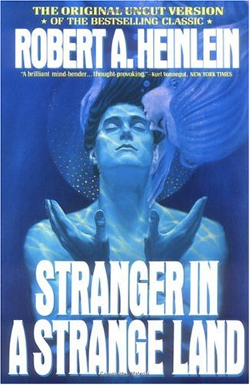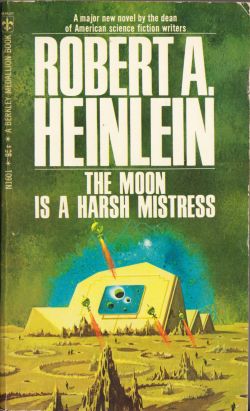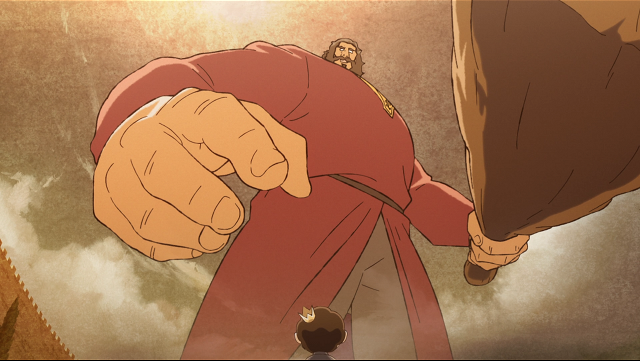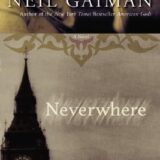Back in 1968, Alexi Panshin published a critical study of Robert A. Heinlein entitled Heinlein in Dimension (now available online at the link). His book had a rather odd history – you can find a one-sided account* of its story here – but it was a rather interesting overview of Heinlein’s works to that point. It does have its flaws, but – in its honour – I decided to entitle this essay Heinlein in Reflection.
First, a brief recap. Some months ago, I volunteered to do a Retro Review of Starship Troopers for Amazing Stories. Steve Davidson suggested I review the remaining two books in the three that Heinlein believed encompassed his politics; Stranger in a Strange Land and The Moon is a Harsh Mistress. Somewhere along the line, this turned into a review of Farnham’s Freehold and To Sail Beyond The Sunset. (Earlier, I also reviewed Podkayne of Mars, at least partly because I read a strongly negative review and felt the urge to reread the source material.) Looking back left me convinced of two things: first, Heinlein was far more diverse than his critics painted him (which became the subject of another essay) and, second, he was never as black as his critics painted him. Heinlein was, in effect, a man who was before his time and after his time, but never truly a man of his time.
 Perhaps because of this, Heinlein and his legacy have been savagely attacked. The hoary old chestnuts of ‘racist’ and ‘sexist’ and ‘fascist’ have been trotted out of the stable and aimed at Heinlein, simply because Heinlein was not a man of our time. Some critics have latched on to tiny details – Meade’s lack of presence and characterization in The Rolling Stones, for example – and used it to accuse Heinlein of sexism. Others cherry-pick examples from Heinlein’s earlier works and use them to slam the author, while still others just point and shriek at Heinlein without bothering to apply any critical thought. One may argue – many do – that attacking Heinlein is attacking the roots of science-fiction itself, that the haters are motivated by spite and/or a simple refusal to accept Heinlein’s works on their own terms (The Rolling Stones is a book for young male teens; Starship Troopers is about another young man maturing). Others might point out, in response, that Heinlein lived in a world that, in many ways, was very different to ours. He saw further than most, but he still had his blinkers.
Perhaps because of this, Heinlein and his legacy have been savagely attacked. The hoary old chestnuts of ‘racist’ and ‘sexist’ and ‘fascist’ have been trotted out of the stable and aimed at Heinlein, simply because Heinlein was not a man of our time. Some critics have latched on to tiny details – Meade’s lack of presence and characterization in The Rolling Stones, for example – and used it to accuse Heinlein of sexism. Others cherry-pick examples from Heinlein’s earlier works and use them to slam the author, while still others just point and shriek at Heinlein without bothering to apply any critical thought. One may argue – many do – that attacking Heinlein is attacking the roots of science-fiction itself, that the haters are motivated by spite and/or a simple refusal to accept Heinlein’s works on their own terms (The Rolling Stones is a book for young male teens; Starship Troopers is about another young man maturing). Others might point out, in response, that Heinlein lived in a world that, in many ways, was very different to ours. He saw further than most, but he still had his blinkers.
 There is, if I can be blunt, an understandable tendency to assume that a writer’s characters are speaking for him, that their impulses and goals match the authors. Yet any author will tell you that that is simply wrong. An author must develop a sense of empathy, even for a fundamentally wrong character; an author must play fair with his characters, particularly the ones he doesn’t like. (Straw characters are rarely amusing, whatever the politics behind them.) Indeed, given how much Heinlein wrote, anyone who assumed that Heinlein agreed with his characters would have to believe that Heinlein suffered from multiple-personality disorder. At base, it is difficult to believe that Heinlein wanted both the worlds of Stranger in a Strange Land and Starship Troopers. They simply don’t go together. As Larry Niven put it:
There is, if I can be blunt, an understandable tendency to assume that a writer’s characters are speaking for him, that their impulses and goals match the authors. Yet any author will tell you that that is simply wrong. An author must develop a sense of empathy, even for a fundamentally wrong character; an author must play fair with his characters, particularly the ones he doesn’t like. (Straw characters are rarely amusing, whatever the politics behind them.) Indeed, given how much Heinlein wrote, anyone who assumed that Heinlein agreed with his characters would have to believe that Heinlein suffered from multiple-personality disorder. At base, it is difficult to believe that Heinlein wanted both the worlds of Stranger in a Strange Land and Starship Troopers. They simply don’t go together. As Larry Niven put it:
There is a technical, literary term for those who mistake the opinions and beliefs of characters in a novel for those of the author. The term is ‘idiot’.”
 One may think that this is a harsh judgement. And yet – looking back – critics have been happy to blame Heinlein for being what he was, a man who was born in 1907 and lived through a profound period of social and political change that, understandably, may not have sat well with him. Heinlein’s life – 1907-1988 – spanned both world wars, the cold war and all its assorted engagements, the fall of the European empires, the civil rights era and the loss of American innocence … Heinlein saw a lot. His experiences – and those of his country and world – shaped his development, as surely as my experiences shaped mine. Heinlein grew up in a profoundly unsafe world, where – eventually – the threat of nuclear annihilation arose to promise the destruction of everything he held dear; his critics grew to adulthood as the world stabilised – for a while – and the prospect of imminent death and destruction faded into the background. Heinlein never knew the safety (and immense comforts) we used to take for granted – and, in many ways, his harsh view of the universe was more practical than anything put forward today.
One may think that this is a harsh judgement. And yet – looking back – critics have been happy to blame Heinlein for being what he was, a man who was born in 1907 and lived through a profound period of social and political change that, understandably, may not have sat well with him. Heinlein’s life – 1907-1988 – spanned both world wars, the cold war and all its assorted engagements, the fall of the European empires, the civil rights era and the loss of American innocence … Heinlein saw a lot. His experiences – and those of his country and world – shaped his development, as surely as my experiences shaped mine. Heinlein grew up in a profoundly unsafe world, where – eventually – the threat of nuclear annihilation arose to promise the destruction of everything he held dear; his critics grew to adulthood as the world stabilised – for a while – and the prospect of imminent death and destruction faded into the background. Heinlein never knew the safety (and immense comforts) we used to take for granted – and, in many ways, his harsh view of the universe was more practical than anything put forward today.
Looking at his career in reflection, I think it is possible to say certain things about Heinlein that shine through his books. It is, of course, impossible to say for sure, but … I think it works. (And someone else will call me an idiot. That is the way of the world <grin>.)
Heinlein was, I think, a dichotomy. Just as Stranger in a Strange Land and Starship Troopers represented, for a while, the bibles of both Left and Right, Heinlein himself was a complicated mixture of cold-blooded realist/pragmatist and hot-blooded fantasist. He knew too much about humanity – particularly men – to fully embrace the more rationalist (in the sense that their characters are rational) worldviews of some of his successors, but – at the same time – he wanted people to be better. He was aware – realistically speaking – of how society’s chains held people, particularly women and blacks, in bondage, yet he also preached of worlds where those chains had been left in the past and forgotten.
It sometimes produced odd results. Hazel Stone, of The Rolling Stones, is an engineer, yet she faced considerable resistance from men in a male-dominated field (and eventually retired to raise her son). It isn’t actually clear if she gave up or not, unlike the main character of Delilah and the Space Rigger, who kept going until she had proved herself. It is clear that she advises her granddaughter, eighteen-year-old Meade, not to go into engineering even though she has the talent – a bad piece of advice or a practical one, given that Meade would have to work hard to prove herself? (Notably, Heinlein never suggests that barring women from engineering is a justifiable attitude; an alternate view of the whole situation might suggest that Hazel’s attitude ruffled too many feathers.)
Indeed, Meade is treated as the subject of a somewhat dishonest review of The Rolling Stones, which may as well serve as a good example of attacks on Heinlein himself. At the start, she is told to stay still … which the reviewer condemns … except she’s being painted, so she has to stay still. Later on, the adults wonder if she is ‘husband-high’ – i.e. old enough to get married. Which sounds awfully sexist, except for the minor detail that she might be spending a large chunk of her early twenties on a interplanetary freighter with no eligible men – a potential problem for someone of her age (and someone who has already shown an interest in men).
Odder still, this same dichotomy between realism and fantasy shows up in Farnham’s Freehold, Heinlein’s most controversial work. Farnham himself concedes that Joe – a black man – would make a good husband for his daughter, but notes that – at the same time – he would not advise such a marriage if they’d stayed in the distant past. The problems facing men and women in interracial marriages were stupendous, at the time. Is Farnham a realist or a racist? It can be argued both ways.
Heinlein did, I think, understand men very well. His grasp of male psychology was far better than most of his successors, although his grasp of female psychology was poor. He expected people to try to be better, but – at the same time – he didn’t condemn them for being what they were. Many of his juvenile novels were successful, at least in part, because he understood what his audience actually wanted. He understood the forces that shape the male mindset and suggested ways to push them in useful directions, instead of alternatively pretending that they didn’t exist or trying to crush them. Heinlein would not, I think, have had any time for either MRA or MGTOW activists, but he would have understood them. His male characters were recognisably human, even when their adventures were set in the far future. Heinlein preached the outwards urge, the desire to go on and found a new home. Our current stagnation owes much to the lack of a frontier.
This wasn’t really true of his female characters, although one could argue that they are reflections of their times too. Podkayne is a sweetly manipulative little teenage girl who reads poorly to our eyes, simply because her society doesn’t read like a natural outgrowth of ours. It is a curious combination of post-racial attitudes mingled with old-fashioned sexism, although it is clear that Poddy’s mother was a well-respected engineer in her own right. I think, at base, Heinlein simply wasn’t good at writing women. He could and did scatter references throughout his text to women who did ‘male’ jobs, but he was a great deal weaker when it came to using them as viewpoint characters. In some ways, indeed, he paid them the odd compliment of treating them as men, once they had been freed of society’s chains. Perhaps Heinlein’s greatest failure was not anticipating the effects – positive and negative – of feminism.
But this may be because of his early life. Heinlein grew up in a world that was very different from ours in many ways, even though it had a certain superficial similarity. (Indeed, many of his early works featured a background that was basically ‘USA IN SPACE.’) Because we don’t understand his world – and his assumptions about how it worked – his critics are quick to condemn. They do not see the past as a different country, nor do they try to engage its residents on their own terms. And while there have been many steps forward – many of which Heinlein predicted – there have also been some steps backwards. One of these, I believe, is a failure to grasp that human nature doesn’t change. Or that TANSTAAFL – There Ain’t No Such Thing As A Free Lunch.
This theme became more pronounced throughout the later years of his writing. In Starship Troopers, Heinlein asks what right mankind has to survive. And he’s right. Why do we have a natural right to anything? The universe doesn’t give a damn about us. Heinlein had no illusions about the world. He knew that expansionist powers – Nazi Germany and the Soviet Union – had to be fought. The peace that prevailed in Europe after WW2 was not the result of natural law, but NATO’s willingness to fight (and that peace is now at an end). Superior military force was, in his view, the key to defending freedom.
Panshin argues that Heinlein’s later characters are focused on survival at all costs, while some of his other critics insist that Heinlein thought that women should have children first and only later have a career. This may be true, but … what’s wrong with survival? What is wrong with wanting one’s culture to survive? The universe rarely admits of neat and tidy solutions to anything … sometimes, you just have to grasp the nettle and fight. It’s a harsh viewpoint, in many ways, but it is true. The universe, like I noted above, simply doesn’t care.
There are people who insist that the destruction of the Native American societies was effectively a horrific genocide. They’re right. It was. But no amount of breast-beating will change the simple fact that it happened, or that human history tells us that the strong will always overpower the weak. (All those jokes about how different history would have been if the natives had an immigration policy have a nasty sting in the tail – immigrants did come to America and displace the natives. Why would anyone want to repeat that experience?) I think that Heinlein understood reality in a way many of his successors simply did not.
In his later years, Heinlein loved to shock. He would push forward controversial ideas – cannibalism, incest, etc – forcing his readers to actually think … and then question the foundations of their society. He asked questions that needed to be asked, although many of his answers were weak; he shocked, but then tried to show the consequences and downsides of breaking society’s rules. In doing so, he laid the foundations for much – much – more.
To some extent, as his career developed, Heinlein slowly shifted from writing adventure stories to writing literature. Many of his early works were thrilling stories for young men – often subjected to the editor’s pen – but his later works were more elaborate pieces of literature, more interested in developing their ideas than telling a story. (One of the reasons I didn’t like Starship Troopers as a young man was because it is a philosophical work, rather than an adventure story.) In some ways, it allowed him to get his ideas across, but – in other ways – it weakened them. He was still more effective, as a writer, when he didn’t hammer his ideas home. He trusted his readers. It is a lesson that many more modern writers could stand to learn.
Over the last few decades, there has grown up a belief that figures of the past can be judged by modern-day standards … and then rejected, when they – unsurprisingly – fail to live up to them. George Washington has been attacked for keeping slaves, even though he also saved the American Revolution and ensured that America would neither shatter into dozens of smaller countries nor turn into a dictatorship. Other figures have been subject to the same treatment, even though they were never men of our time. Heinlein, for all his contributions to the field of science-fiction (and a progressiveness that was quite shocking, by the standards of his time), has been blasted for not being progressive enough. He has been quoted out of context, reviewed with neither comprehension nor contextualisation and his supporters have been attacked for daring to support him. Very few people – and Heinlein knew this – are wholly good or evil. Heinlein was neither a angel nor a devil, but a man.
I’d like to finish by paraphrasing a quote from Jonathon Strange and Mr. Norrell that, I think, fits Heinlein like a glove.
It is the contention of modern critics that everything belonging to Robert Anson Heinlein must be shaken out of modern SF/Fantasy, as one would shake moths and dust out of an old coat. What does they imagine they will have left? If you get rid of Robert Anson Heinlein you will be left holding the empty air.”
(Editor’s note: while there are two sides to every story, Panshin’s accounting of the attempts by RAH to prevent the publication of Heinlein in Dimension and actions taken subsequently are supported by the historical record, as well as by eyewitness accounts privy to the “Good Day, Sir!” incident.)
(Editor’s second note: there is a wealth of coverage of Robert A. Heinlein, his works and his interactions with Fandom here on the site.)













Heinlein as a libertarian is too progressive for (so-called) progressives. That’s why they attack him.
Heinlein is the modern Plato.
In some respects you are correct – if you buy into the idea that you can classify large groups of individuals as having some kind of common political ideology. In reality, Heinlein was an individual who had wide ranging ideas and beliefs on a variety of subjects; many of those beliefs changed over time and, had he lived longer, no doubt some of those opinions would have changed again.
When this subject comes up, I prompt people who use buzz words like “liberatariansim”, “progressive”, “right wing” etc., to ask themselves two questions: is the political alignment they identify with a monoliithic entity, or does it consist of many different opinions colaescing around some basic concepts and do their own beliefs and opinions align – 100% – with those of the political entities represening them?
I have yet to run into anyone who answers “yes” to both questions.
I believe this strongly suggests that we need to stop using such broad identifiers if we are at all interested in meaningful political discussion.